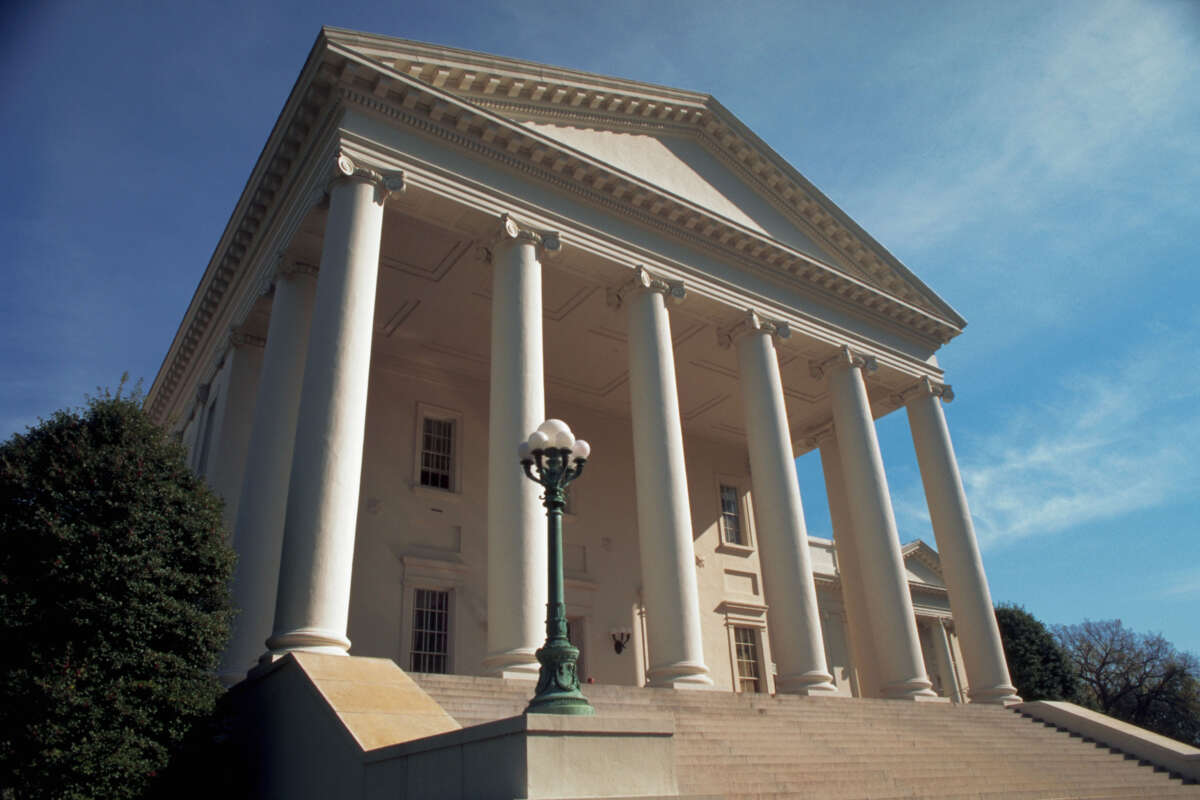Honest, paywall-free news is rare. Please support our boldly independent journalism with a donation of any size.
Democratic lawmakers in Virginia have advanced three constitutional amendments to restore voting rights, protect reproductive freedoms and enshrine marriage equality in the state’s highest governing document.
The measures passed within Virginia’s House of Delegates last week, mainly along partisan lines, with all Democrats in the chamber voting in support of them and most of the Republican caucus voting against. The amendments passed in the Senate on Tuesday, again mostly along party lines.
To become an amendment, a measure must pass by a majority vote of both houses within the Virginia General Assembly, after which a round of new legislative elections must take place. After that election process happens, the measure must be passed again, which places it on a statewide ballot for voters to give their up-or-down approval on. If voters vote in favor of the measure, it becomes codified in the state constitution.
The first measure proposed, HJ1, would assert a fundamental right to reproductive rights, and would ease restrictions on abortion care.
“Every individual has the fundamental right to reproductive freedom and that the right to make and effectuate one’s own decisions about all matters related to one’s pregnancy cannot be denied, burdened, or otherwise infringed upon by the Commonwealth,” a summary of the measure reads.
The amendment would also make it simpler for a pregnant person to receive emergency abortion care in the third trimester, dropping the number of physicians needed to approve such care — currently at three required by the state — down to just one physician.
HJ2 is an amendment to restore voting rights to people formerly convicted of and incarcerated for a felony. Currently, Virginia law does not automatically restore such individuals of those rights, and to have them given back, they must petition the governor. Previous administrations have signed thousands of such orders, restoring the rights of those Virginians, but current Republican Gov. Glenn Youngkin has halted that process.
“A person who has been convicted of a felony shall…be invested with all political rights, including the right to vote,” once released from incarceration, a summary of the amendment explains.
Defending the voting rights provision against Republican opposition, Democratic Sen. Mamie Locke, who sponsored the measure, said that people are “more than the worst thing they have ever done.”
Formerly incarcerated individuals, Locke asserted, “once they have served their time, they have a fundamental right to vote once they get out.”
HJ9, the only measure to receive some Republican support, would remove a previously passed amendment that denies same-sex couples of the right to marry in the state. That amendment is currently blocked by the 2015 U.S. Supreme Court decision Obergefell v. Hodges, but if that ruling was overturned, Virginia’s anti-marriage equality amendment would become enforceable once more.
The new measure would do more than just remove that older amendment from the state constitution — it would also protect marriage equality, enshrining the right within the document.
“The amendment provides that the right to marry is a fundamental right inherent in the liberty of persons and prohibits the Commonwealth and its political subdivisions from denying the issuance of a marriage license to two parties contemplating a lawful marriage on the basis of the sex, gender, or race of such parties,” the summary of that measure reads.
The three measures will undoubtedly play a major role in the 2025 legislative elections in the state, given that, should Democrats fail to win those races, they will lose control of the state legislature, and at least two of the three measures (and perhaps all of them) would be blocked by Republicans from passing next year.
Democrats appeared certain that their gamble on these measures would pay off.
“We will enshrine these rights to our Constitution, ensure our freedoms are no longer at risk, and hand the power back to the people,” Democratic Sen. Jennifer Boysko said on Tuesday.
A terrifying moment. We appeal for your support.
In the last weeks, we have witnessed an authoritarian assault on communities in Minnesota and across the nation.
The need for truthful, grassroots reporting is urgent at this cataclysmic historical moment. Yet, Trump-aligned billionaires and other allies have taken over many legacy media outlets — the culmination of a decades-long campaign to place control of the narrative into the hands of the political right.
We refuse to let Trump’s blatant propaganda machine go unchecked. Untethered to corporate ownership or advertisers, Truthout remains fearless in our reporting and our determination to use journalism as a tool for justice.
But we need your help just to fund our basic expenses. Over 80 percent of Truthout’s funding comes from small individual donations from our community of readers, and over a third of our total budget is supported by recurring monthly donors.
Truthout has launched a fundraiser, and we have a goal to add 280 new monthly donors in the next 72 hours. Whether you can make a small monthly donation or a larger one-time gift, Truthout only works with your support.
